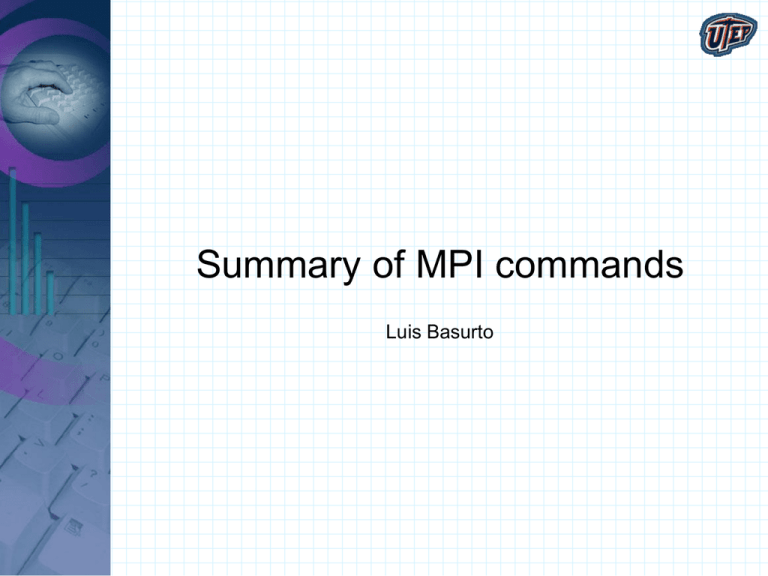Summary of MPI commands
advertisement

Summary of MPI commands
Luis Basurto
Large scale systems
•
Shared Memory systems
–
•
Memory is shared among processors
Distributed memory systems
–
Each processor has its own memory
MPI
•
Created in 1993 as an open standard by
large scale system users and creators.
•
Each system provider implements MPI for
its systems.
•
Currently at version MPI-2.0
•
Other implementations of MPI such as
MPICH,OpenMPI.
How many commands?
•
130+ commands
•
6 basic commands (we will cover 11)
•
C and Fortran bindings
How does an MPI program
work?
Start program on n processors
For i=0 to n-1
Run a copy of program on processor i
Pass messages between processors
End For
End Program
What are messages?
•
Simplest message: an array of data of one
type.
•
Predefined types correspond to commonly
used types in a given language
•
–
MPI_REAL (Fortran), MPI_FLOAT (C)
–
MPI_DOUBLE_PRECISION (Fortran),
MPI_DOUBLE (C)
–
MPI_INTEGER (Fortran), MPI_INT (C)
User can define more complex types and
send packages.
Before we start
Include MPI in our program
•
In C/C++
#include “mpi.h”
• In Fortran
include 'mpif.h'
• In C MPI calls are functions
MPI_Init();
• In Fortran they are subroutines
call MPI_Init(ierror)
A note about Fortran
•
All calls to MPI include an extra parameter,
an error code of type integer.
•
Used to test the success of the function
(i.e. The function executed correctly).
Basic Communication
•
•
Data values are transferred from one processor
to another
–
One processor sends the data
–
Another receives the data
Synchronous
–
•
Call does not return until the message is
sent or received
Asynchronous
–
Call indicates a start of send or receive, and
another call is made to determine if finished
MPI_init()
•
Initializes the MPI environment
•
Every MPI program must have this.
•
C
–
•
If using command line arguments
–
•
MPI_Init();
MPI_Init( &argc, &argv );
Fortran
–
call MPI_Init(ierror)
MPI_Finalize()
•
Stops the MPI environment
•
Every MPI program must have this at the
end.
•
C
MPI_Finalize ( );
•
Fortran
call MPI_Finalize(ierr)
MPI_Comm_size()
•
Returns the size of the communicator
(number of nodes) that we are working
with.
•
C
MPI_Comm_size ( MPI_COMM_WORLD, &p );
•
Fortran
call MPI_COMM_SIZE(MPI_COMM_WORLD, p, ierr )
MPI_Comm_rank()
•
Return the zero based rank (id number) of
the node executing the program.
•
C
MPI_Comm_rank ( MPI_COMM_WORLD, &id );
•
Fortran
call MPI_COMM_RANK(MPI_COMM_WORLD, my_rank, ierr )
A note con communicators
•
MPI_COMM_WORLD is the default
communicator (all nodes in the cluster)
•
Communicators can be created
dynamically in order to assign certain tasks
to certain nodes (processors).
•
Inter communicator message passing is
possible.
MPI_Send()
•
C
MPI_Send(void *buf, int count, MPI_Datatype
dtype, int dest, int tag, MPI_Comm comm);
•
Fortran
Call MPI_Send(buffer, count, datatype,
destination,tag,communicator, ierr)
MPI_Recv()
•
C
MPI_Recv(void *buf, int count, MPI_Datatype
dtype, int src,int tag, MPI_Comm comm,
MPI_Status *stat);
•
Fortran
Call MPI_Recv(buffer, count, datatype,
source, tag, communicator,
status, ierr)
MPI_Bcast()
•
Send message to all nodes
•
C
MPI Bcast(void * buf, int count, MPI_Datatype
dtype, int root, MPI Comm comm);
•
Fortran
CALL MPI_BCAST(buff, count, MPI_TYPE,
root, comm, ierr)
MPI_Reduce()
•
Receive message from all nodes, do
operation on every element.
•
C
MPI_Reduce(void *sbuf, void* rbuf, int count,
MPI_Datatype dtype, MPI_Op op, int root,
MPI Comm comm);
•
Fortran
CALL MPI_REDUCE(sndbuf, recvbuf,count,
datatype,operator,root,comm,ierr)
MPI_Barrier()
•
Used as a synchronization barrier, every
node that reaches this point must wait until
all nodes reach it in order to proceed.
•
C
MPI_Barrier(MPI_COMM_WORLD);
•
Fortran
call MPI_Barrier(MPI_COMM_WORLD,ierr)
MPI_Scatter()
•
Parcels out data from the root to every
member of the group in linear order by
node
•
C
MPI_Scatter(void *sbuf, int scount, MPI_Datatype
sdtype,void *rbuf, int rcount, MPI_Datatype rdtype,int
root, MPI_Comm comm)
•
Fortran
CALL MPI_SCATTER(sndbuf,scount,datatype,
recvbuf,rcount,rdatatype,root,comm, ierr)
MPI_Scatter
Node 0
Node 1
Node 2
Node 3
MPI_Gather()
•
C
MPI_Gather(void *sbuf, int scount,
MPI_Datatype sdtype,void *rbuf, int rcount,
MPI_Datatype rdtype,int root, MPI_Comm
comm)
Fortran
CALL MPI_GATHER(sndbuf,scount,datatype,
recvbuf,rcount,rdatatype,root,comm,ierr)
Deadlock
•
The following code may provoke deadlock
if(rank==0) {
MPI_COMM_WORLD.Send(vec1,vecsize,MPI::DOUBLE,1,0);
MPI_COMM_WORLD.Recv(vec2,vecsize,MPI::DOUBLE,1,MPI::ANY_TAG);
}
if(rank==1) {
MPI_COMM_WORLD.Send(vec3,vecsize,MPI::DOUBLE,0,0);
MPI_COMM_WORLD.Recv(vec4,vecsize,MPI::DOUBLE,0,MPI::ANY_TAG);
}
Bcast
•
Must be called by all nodes, the following
code will not work
if(rank==0) {
MPI_Bcast(&value, 1, MPI_int,0, MPI_comm_world);
}
else {
/* Do something else */
}
Questions








